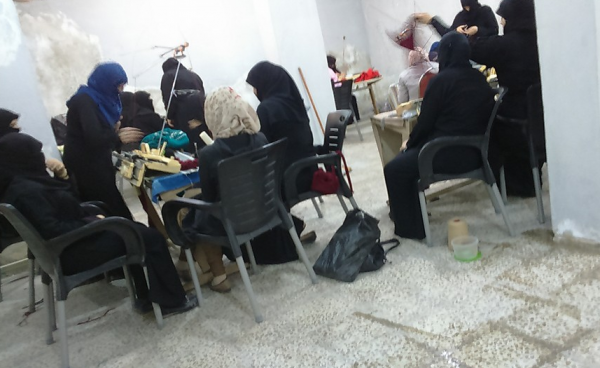Knitting the Way to a Brighter Future

Women at Tricot workshop. A private photo from the workshop's archive.
"New initiative is offering skills to boost self-sufficiency."
A knitting project in the town of Maarrat al-Nu’man is both giving local women new economic tools and helping revive the local economy.
The Tricot project, launched with the support of the Takmeen programme for local initiatives and supervised by the city’s local council, aim to teach dozens of local women how to use knitting machines. Five trainers are enployed by the workshop.
Aaicha al-Toma, deputy chairman of the Tamkeen project’s central committee in Idlib, said that local women had themselves identified a knitting workshop as the most viable option for boosting their incomes.
The 37-year-old explained that Tricot was the only such project in the city or indeed the wider area, and once fully functional the workshop could satisfy the local market’s need for woolen products.
In order for this to happen, she continued, the workshop “must be productive, provide more job opportunities and train more women.” Priority is given to widows and the wives of detainees.
The project has proved so successful since it was inaugurated on September 22, 2016 that Tamkeen extended its initial three-month period of support by an additional two months, as well as introducing financial incentives for trainees.
Workshop supervisor Salma Blany said, “The aim is to teach women how to use knitting machines so they can secure an income for their families as well as ensuring self-sufficiency for a community under blockade by regime forces. A large number of women wanted to learn these skills with the help of trained experts at the centre.”
Local council member Khaled al-Jerban, 31, said, “The local council of the city raised several proposals for various projects to the Tamkeen committee for supporting local initiatives. The Tricot project was one of them, and it was approved and work begun under the supervision of the council. A showroom for the workshop products was established where woolen pieces are sold at low prices so help cover future expenses.”
One trainee, who asked to remain anonymous, said that she had already produced and sold her own work.
“The first activity I took part in was an exhibition of woolen products of the workshop, it lasted three days and sold products at a low price.”
The programme had given her a way to support her family in the absence of her husband, a detainee.
“I am a mother of three children and my husband was arrested a year ago in the city of Hama,” she explained. “So I decided to go out to work to ensure we had an income. I learned knitting through training in the workshop. They taught us how to disassemble and reassemble the machine and now I am able to do that.”
Her fellow trainee, 40-year-old Um Hassan, agreed.
“The opening of the Tricot workshop was a great opportunity for us women, especially in light of the lack of job opportunities in our areas,” she said.
Um Hassan continued, “After losing my husband in the battle to liberate Maarrat al-Nu’man, I no longer had any means of support, so I just got aid from here and there. But I decided I had to support myself and my kids and I joined the workshop to learn knitting. Now I can produce good woolen pieces.”
